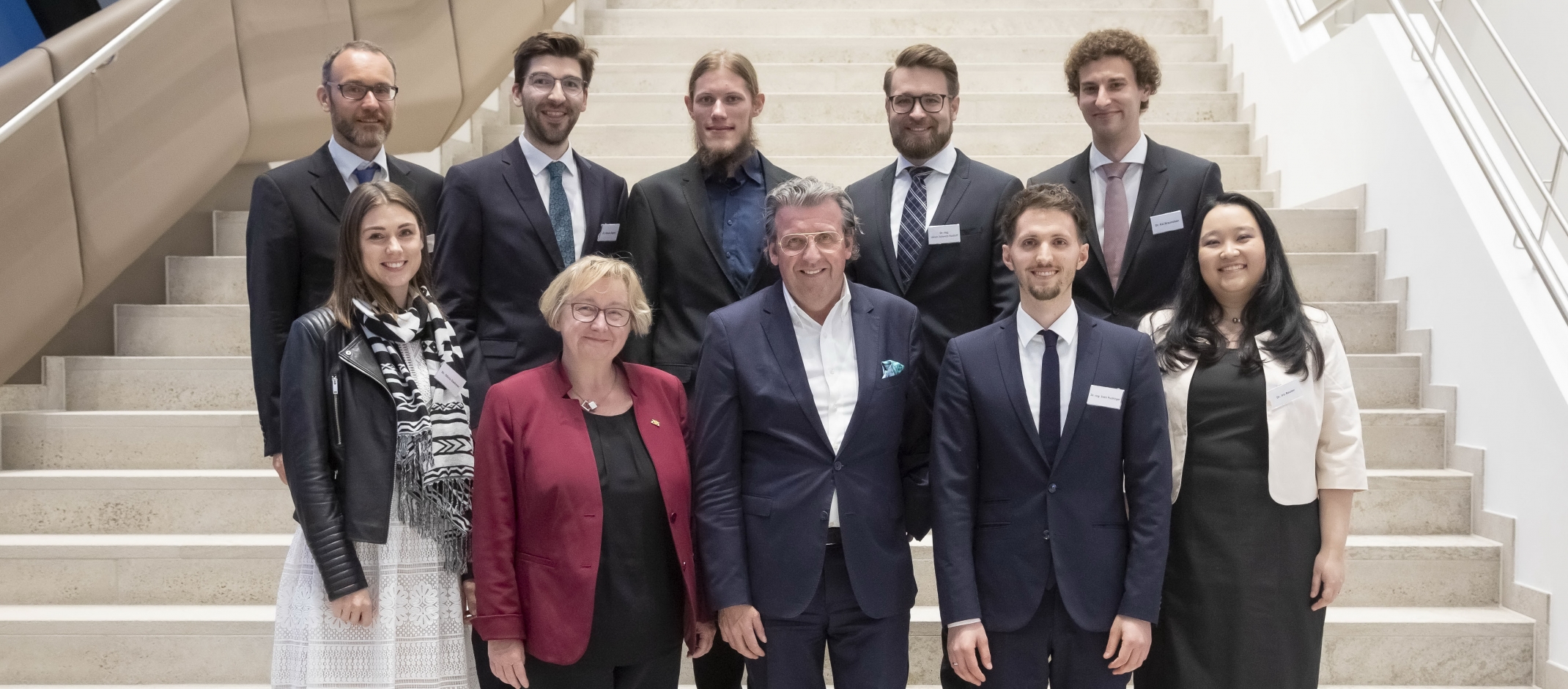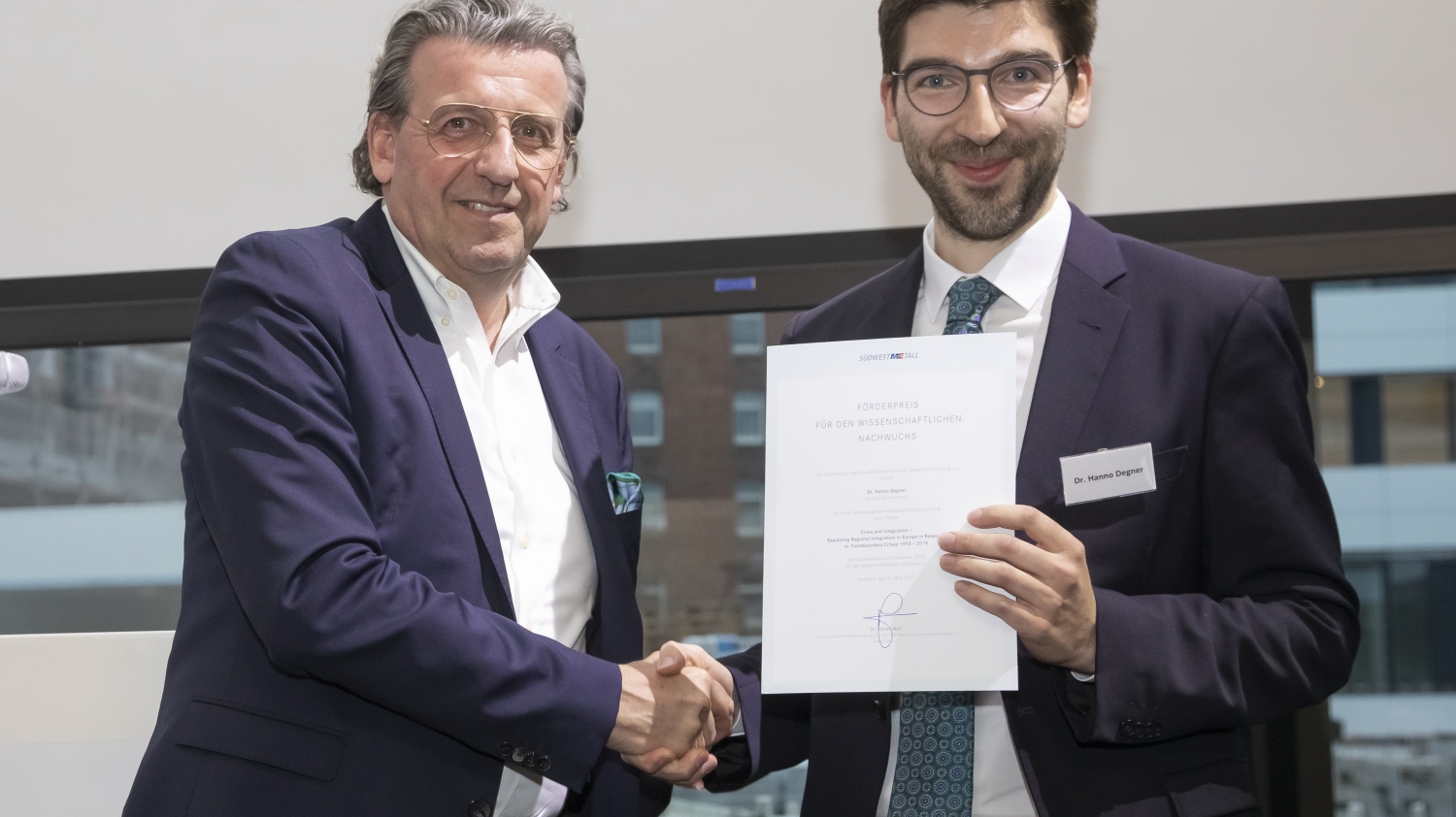Crisis and integration in the EU

The Südwestmetall trade association for the metal and electrical engineering industries in Baden-Württemberg honours the outstanding achievements of early career researchers at Baden-Württemberg’s nine state universities. Dr Hanno Degner, postdoctoral researcher in the Department of Politics and Public Administration, is the 2019 laureate at the University of Konstanz. At the awards ceremony in Stuttgart, Südwestmetall chair Dr Stefan Wolf presented the nine laureates with their awards, each endowed with € 5,000. “An excellent and well-performing higher-education and research system has an important role to play”, he explained at the event attended by Theresia Bauer, Minister of Education in Baden-Württemberg.
Hanno Degner was awarded the prize for his dissertation in the field of political science: “Crisis and Integration – Explaining Regional Integration in Europe in Response to Transboundary Crises 1993 – 2015”. His work, which was supervised by Konstanz political scientist Professor Dirk Leuffen, provided “an excellent examination of the ability of crisis management mechanisms in the European Union to act as a motor for greater European integration”, Südwestmetall notes.
© SWM/WagnerSüdwestmetall chair Dr Stefan Wolf (at left) and Dr Hanno Degner, Südwestmetall award recipient from the University of Konstanz at the awards ceremony in Stuttgart.
Degner’s work focused on the effect of crises on integration in the European Union (EU). The broader question is: Do crises lead to greater integration, and, if so, why and how? In order to answer this question, Degner’s study provides a detailed analysis of the decision-making dynamics at the national and European levels during three major crises that impacted different political fields of the EU over the last 30 years.
“I examined the BSE crisis of the 1990s, the security crisis after 11 September 2001 as well as the Euro crisis from 2010 to 2015”.
Hanno Degner
He argues that each emerging crisis reveals legal-institutional problems in the EU and brings them to the forefront of the public’s attention. For the governments of the EU member states, solving these problems thus becomes a very important and possibly the deciding factor in elections. Well-organized national interest groups or political elites use the resulting window of opportunity to present their ideas for political change to their respective governments. The governments then calculate the material and political costs of these proposals and choose the most cost-efficient ones as the basis for negotiations with their international partner states.
Due to the enormous cost of not reaching an agreement and the difficulty of solving international crises through national efforts alone, European governments usually do pass reforms that lead to a greater integration within the EU. At the same time, these are often compromises, lowest-common denominator solutions that carry with them the potential for a new crisis. “It is true: European integration fails again and again. But it fails forwards”, says Hanno Degner.
Key facts:
- In 2019, Dr Hanno Degner at the University of Konstanz receives one of nine prizes from the Südwestmetall trade association that are awarded annually to students at each of the state universities in Baden-Württemberg
- Prize-winning dissertation: “Crisis and Integration – Explaining Regional Integration in Europe in Response to Transboundary Crises 1993 – 2015”
- Prize from the Baden-Württemberg trade association for the metal and electrical electrical industries endowed with € 5,000
- Award recognizes exceptional work by early career researchers at each of the nine state universities in Baden-Württemberg

